 |
  |
 |
  |
 |
 |
| |

Read Bjork's2001 interview with Juergen Teller from the index archives. |

|
 |

Kathleen Hanna discusses writing and making music in this interview from 2000 with Laurie Weeks. |
|
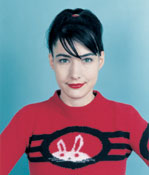 |
|
 |
|
|
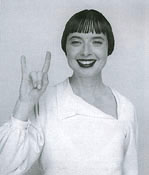 |

Isabella Rossellini spoke with Peter Halley in this 1999 interview. |
|
 |
|
|
 |
 |
|
Alexander McQueen's 2003 interview with Bjork. |
|
 |
|
|
 |
|

|
| Jackie Rogers, 1997
WITH DAVID SAVAGE
PHOTOGRAPHED BY CHRIS BUCK |

Jackie Rogers' dresses convey, like the designer herself, a tough glamour. Hugging the body through their signature bias cuts and draping with luxurious gravity in such fabrics as silk satin, crepe or georgette, each dress reads like a confident statement about the wearer's sensuality. Her designs bear no evidence of concessions to the latest runway fad. They are simple and unapologetically feminine clothes, appealing to women who maintain a vive la difference attitude toward men. Her dresses move briskly off the racks at Barneys and Fred Hayman's in Beverly Hills, says one source, and her other line of custom-tailored suits for daytime have a devoted, uptown clientele. Jackie Kennedy was a longtime wearer of Rogers' clothing, as her sister, Lee Radziwill, still is. Other clients include Angelica Huston, Diana Ross, Pia Lindstrom, and as of today, country singer Ashley Judd.
It's a headache of a workday afternoon. Rogers is marching around her garment center studio in form-fitting black and high-heeled boots, riding her staff hard over a dress that turned up three inches too short on a fit model. Coco Chanel called her "The Cowboy" for her American habit of sticking her hands in her jacket pockets, but today the nickname seems as apt as ever, but not for that reason. Her rich, husky voice is jumping from purring to curse-laced bellowing in sudden flashes. It's perhaps her most striking quality, made all the more intimidating by her six-foot tall frame.
"She is a thunderbolt," says Andre Léon Talley, European Editor of Vanity Fair and close friend. "While she fascinates, at the same time, like lightning striking suddenly, it can be shocking, off-putting. Underneath all the clapping and clashing, there is a genuine heap of strength, tenacity and talent. Jackie makes wonderful, minimalistic, modern clothes. I think her silk satin slip dresses stand up to the best and the most acknowledged of that school of design."
DAVID: Did your minimalistic approach come after a long time of experimentation?
JACKIE: Oh, I don't know. If you want to call it that...is it minimalization? Less is better. Less is more. Who said that.
DAVID: I think it was Mae West.
JACKIE: Oh, ho, ho, ho...I don't know...maybe.
DAVID: Your dresses emphasize line and proportion above all else. How did you hit upon that concept?
JACKIE: Well it's innate. You cultivate that constantly. It's takes years to really get it. I'm always preoccupied with line. I can see something and I then I go for that. It's the lines on a dress and I can see it. And after a while if they don't do it right I get a little crazy because I can't go over it and over it again or else I lose it. That line and shape and form is very important to me, it always has been, since I was a kid. I designed my own clothes as a kid, and I think that I didn't even think about myself as a designer, I was just preoccupied with it.
DAVID: Does your interest in the female body dictate the way you design?
JACKIE: No, it has nothing to do with the female body. I know that that's what works for me...it enhances it, so I think about that, if it's going to enhance the figure. I don't go and say, oh I want to do this, or do it because I like it, I do it because obviously I think it's going to enhance the female form, man or woman, whatever it is.
DAVID: There's a great deal of glamour to your dresses.
JACKIE: Yeah, I like that.
DAVID: I have a feeling you played a lot of hooky as a kid and hung out at the movies.
JACKIE: Oh yeah, how did you know that? Oh you knew that already...I lived at the movies. I think Ginger Rogers and Fred Astaire saved my life. Yeah, I played hooky and lived at the movies...all that glamour! Yeah, it is glamour. I believe in a glamourous life! And I think that it's very exciting.
DAVID: If you could pick up three movie stars that you most looked up to in terms of style when you were a kid, who would they be?
JACKIE: Greta Garbo...always. When I first started seriously designing, I think the first dress I ever designed was something she wore in Ninotchka. Big dolman sleeves, it was gorgeous...
DAVID: What about her smoking look? Was that influential to you?
JACKIE: No, I knew Greta Garbo. I met her in the Sixties, in the South of France, when she was living with George Schlée, who was Valentina's husband. Valentina was a great designer, they all lived together or some such thing. They all lived around the corner from me and we became very friendly. And I think that he was the one that made her mystique. She always wanted to go out to parties and he would keep telling her, "You can't come, you have a mystique to follow." So I did meet her and we used to swim together. She was very nice...I don't know who else. Today's movie stars I don't call movie stars, I don't know what they are. Over the years I've dressed Jaqueline Kennedy and her sister Lee, and all those people.
DAVID: I once read that you said your father was the first person from whom you learned how to really dress. Is that true?
JACKIE: My father? Oh, maybe, yeah, because he used to buy us all the most expensive clothes, I remember that. He always wanted us to have the very best quality, and he'd take us out shopping and my sister, my mother and myself, we'd all have great looking clothes. So that, in a sense I guess, was true. So I really got a feeling for that. My mother was a hat designer.
DAVID: Did she educate you about dressing?
JACKIE: Yeah I think so. I've always read Women's Wear since I was a kid.
DAVID: I know you married relatively early in Boston, but the marriage didn't take off, so you moved to New York and worked for Nettie Rosenstein.
JACKIE: I worked as a house model...I actually first started at Priscilla of Boston, which was a bridal house, and then I came to New York and worked for Nettie Rosenstein and it was a great experience. I don't think she's a designer anyone even knows anymore, but at that time 550 Seventh Avenue was a very exclusive building. There was Norman Norrell, B.H. Ragy and Claire McArdle, and all these different floors and you went in there and it was very imposing. When I went to work for Chanel in Paris years later, it reminded me very much of that atmosphere. There was an atelier in those days, we had a maid at Nettie Rosenstein, we had lunch every day there, it was quite exclusive.
DAVID: What took you to Europe?
JACKIE: Well I just went for the weekend. To have some fun. I went there actually because a girlfriend of mine was married to Sam Spiegel, the film producer. She said let's go over there, and we can go on Sam's boat, and I had never been there, so I thought oh what a great idea. So I got my ticket and when I went to leave, she wasn't leaving, she said he was coming back here, but I didn't know that they had their own different ways of living, I was pretty naive, so I went, and I called him up, I stayed at the Dorchester Hotel and he invited me on his yacht in the South of France and...where was it...in Cannes, and I got on the boat and there was David Lean and Lela Lean and Kay Kendall and Rex Harrison and Anatole Litvak and...
DAVID: Were you star struck?
JACKIE: Sure! You know, I was there wearing my Anne Klein pleated skirt and my David Evans shoes.
DAVID: Can you describe your first meeting with Coco Chanel and how you came to be a house model there?
JACKIE: Actually I was getting my hair done at Alexandre in Paris and someone was talking about Chanel looking for new models because they were leaving. And I thought gosh that's a good idea, maybe I'll just go up there, so I called up and made an appointment and I went in there and she hired me.
DAVID: You met with her face-to-face?
JACKIE: Oh yeah.
DAVID: Why did she call you The Cowboy?
JACKIE: Because I needed to do something with my hands. And she needed to make suits with pockets, I wanted pockets, like a cowboy.
DAVID: Another one of your contemporaries there was Betty Catroux.
JACKIE: Oh yeah, Betty was there. But I had met Betty when I was in the South of France, that summer. And Betty and I became very close friends and we are to this day. And she's married to François Catroux, the designer.
DAVID: Then you went to Rome.
JACKIE: Yes, I lived between Rome and Paris, actually.
DAVID: So while you were a model in Paris at the house of Chanel you were also spending time in Rome.
JACKIE: Well, what I did was I went there and I had an apartment on the Via Marguta and what happened I..uh...God I've said these things so many times it sounds repetitious...
DAVID: Not to me. It will all be fresh.
JACKIE: Okay, okay. What happened was I was living in Rome and I was with my boyfriend in Paris, [an Italian prince] and that's when Chanel hired me. And I was going back in July to work for her. But I was going to do a movie for Fellini called 8 1/2. And he was going to start in May, but as always, he never started on time, and I had to go to Chanel because I promised I'd be back, so I go to Paris to work and all of the sudden, the collections, as this and that, and two days after the collections, he calls me, "Where are you!" So I said "I'm in Paris!" So he said, "I've got this role for you," and of course I said "I can't leave!" So I went to Chanel and Chanel said, "Okay, listen, if you want to be a movie actress you better leave." I said, "I don't know that I want to be a movie actress," and sit there all day, which is what you do, so I called up and said "I'll get there when I get there." And I got there in September, and he made me a part, Mr. Fellini.
DAVID: Tell me about your first meeting with Fellini.
JACKIE: Well it was a whole intellectual group in Rome...
DAVID: Cafe society...
JACKIE: Well, there was a girl called Laura Betti who was sort of the enfant terrible, who was like a singer of songs and Pasolini wrote songs for her and Moravia wrote songs for her and she was my best friend because that's who I lived with, I don't know... I found her somehow-we all got together. Who knows, I found her, she found me, and she had everybody in the world come to her, including Ustinov, I mean, in those days, you've got to remember in the 60s in Rome, everyone was there making movies. It was a very exciting time, and so that's how I met Federico, and he loved me, and I loved Federico. He picked me up every day for lunch and we'd go to his tailor and he'd get to know me and what I was about-that's how he operated with his actresses.
DAVID: So he really was social with them?
JACKIE: Oh yeah, to a large degree. He picked people up off the street because he liked there faces and put them in a movie, that was his thing. Sometimes they'd walk off the set, as I saw happen a few times. You know, they got bored. You sit there all day-"Forget it, I'm leaving!"
DAVID: What is your most vivid memory of Fellini?
JACKIE: I don't know...I still have his phone number in my address book...oh lots of things. When we came here to do 8 1/2, the opening, I'll never forget Joe Levine was the producer and he gave a private party at the opening on 57th Street, and nobody understood the movie. And we had our own party and Marcello Mastroianni locked Federico and I in the closet-
DAVID: Of your hotel room?
JACKIE: Of the Pierre, I'll never forget it, it was very exciting.
DAVID: Why did he do that?
JACKIE: I don't know, he thought I was in love with him but that really wasn't the case.
DAVID: Were you friendly with Marcello?
JACKIE: Oh yeah, I loved Marcello. He was a divine man. He was very human, he wasn't that romantic thing they made him out to be. He was a real...as they say in Yiddish, hamische, a very hamish guy.
DAVID: Tell me about when you left Paris and came back to New York and opened a boutique-slash-hair salon.
JACKIE: Yeah, I was broke, I didn't have any money, I didn't know what I was doing, should I come back, should I-you know in those days, it was very difficult, I mean I was running between Rome and Paris, you know I didn't care about money, I'm still not motivated by it. I came back here and I didn't know what I was going to do. I had to go back to modeling, I hated the whole idea of it, but I did because it was money. And I had a success. And in those days they said Oh you can only wear Chanel and you can't wear dresses, I mean, crazy stuff. And I proved that they were wrong and I became quite successful again and I thought, how can I get out of this? And a guy was cutting my hair at Vidal Sassoon, said he had 250 men that he was cutting hair for at night. I said, "Well, let's go into business," I don't know where that came from. But that's how it happened.
DAVID: Had you ever cut hair before?
JACKIE: I didn't cut it, he cut it. So we started in my apartment on East 74th Street-it was great. We had all these guys and then I opened up this place and the world came and the rest is history. It was fabulous.
DAVID: What type of clientele did you have?
JACKIE: Oh you name it, from Winthrop Rockefeller, in those days, Jackie Gleason, Tom Jones and Dustin Hoffman-everybody hung out there. When they did the Godfather 1, everybody was in there getting their hair cut while they were shooting the movie up on Fifth Avenue. It was really great, Bobby Evans, and all those guys.
DAVID: When did it also expand into the men's clothing boutique?
JACKIE: Oh well that was going on at the same time, yeah, both. And then I went into the men's clothing myself, and it became very successful.
DAVID: But you weren't designing men's clothes-
JACKIE: Yes I was. I worked for Joseph H. Cohen, which later became Botany 500. And I did that, and then I stopped doing that because I was split two different ways and then I went to Rome and I bought Italian clothes and I found a guy called Giorgio Armani. And I introduced him into America. I was the first one to find him a seller in Milan, and then he did the men's clothing. Around '71, '72.
DAVID: What sort of clothing were you doing for men then?
JACKIE: The same thing, I mean I did unlined suits, and no vents, I like tight, grab-your-behind, I love that, so he can pick up the jacket and put his hands in his pockets, I love that.
DAVID: How do you like to see a man dressed? What sort of man turns you head on the street?
JACKIE: Well I sure as hell don't like those suits with the shoulders hanging out to here-
DAVID: You mean the broad-shouldered suits-
JACKIE: Yeah. I think the English cut is the best.
DAVID: Tailored, fitted.
JACKIE: Oh, yeah-the best.
DAVID: Were you influenced at all by the downtown scene at that time, with the hippie culture and psychedelic drugs?
JACKIE: Oh honey I had my time, let me tell you. I mean I lived in 54, so that should tell you something.
DAVID: But how was your design influenced by those times?
JACKIE: I don't think I've ever been influenced by anything outside. I really am not. I mean I can look in a magazine and see something and think, oh I love that look, and then I try to something like that and then go somewhere else with it.
DAVID: Well the reason I ask that is because young designers now seem to take all their cues from the street, from pedestrian culture. They see color combinations and shapes they like and then duplicate it, or use it as inspiration.
JACKIE: That's a big mistake. I don't understandthat. It's not being creative. It's copying. It's styling. That's styling, I think.
DAVID: What did Chanel teach you that you brought back with you to America?
JACKIE: Style, baby. It had nothing to do with clothes so much as it had to do with fit, and cut, and look. I mean Chanel was into line, she didn't know from...I mean she would work by tearing a suit apart, or a dress, by destroying it completely to get the line.
DAVID: Bernardine Morris told me that there's a famous photograph of you with Coco Chanel, and she's adjusting a dress on you, and her hand in inside the dress on your bosom. She said the photo caused quite a stir.
JACKIE: She's crazy. What the fuck is she talking about...that old broad is nuts. I don't know about that. Chanel and I, first of all they came in a said we were lovers, then they asked me if I was her daughter, you know, all kinds of craziness. I have some pictures somewhere...
DAVID: But you're saying that she taught you more about style than technique.
JACKIE: Let me tell you something. First of all, Chanel had great taste. Okay, she was very difficult, and we all loved her. We all adored her. When you came to her apartment it was fantastic! And there were great interior decorators at that time who copied whatever she did. And to this day her look is sensational. I don't know if you ever saw pictures of the apartment on the Rue Cambon, it's been photographed dozens of times.
DAVID: I saw her old leather sofa in a showroom downtown.
JACKIE: Yeah, I mean the whole idea I found a magazine here, and she had a house above Monte Carlo in the South of France in the early twenties or thirties and it was very austere and very beautiful. She was well before her time, always. She did innovate many things. You know, wool jersey? That menswear, or something that was men's underwear that she used, I mean all that stuff.
DAVID: You have a reputation for being a very honest, tough woman.
JACKIE: Well I am. Why not?
DAVID: Has it ever cost you professionally?
JACKIE: I'm sure. I don't know, I don't want to be honest at other people's expense. You know, I don't believe in that, "I'm telling you the truth about him," I'm not going to sit in judgment on anybody. Who am I to sit in judgment? I'm not God. And God knows I'm not perfect. But I say what's on my mind pretty much and I think people should but not at somebody else's expense. There's different ways of telling the truth. So if I've offended people, I don't know, not these days. When I was younger, at 54, I was doing some numbers there with drugs. Who knows what the hell I was saying. I'm lucky I'm here. Halston's not here. John Belushi's not here. Steve Rubell's not here. I mean Andy died in the hospital from nothing. All these friends of mine...Paul Jabarra...I don't know if these names mean anything to you...
DAVID: Of course they do, all of them do.
JACKIE: I want to cry when I mention Paul's name. All these friends of mine. Henry Post, who was very responsible for Anna Wintour. Henry Post? He brought down 54. You know, it's horrible. But you know, a lot of these people, who ever thought they would go so quickly? So a lot of this energy that you had is no longer here. A lot of people that are on heroin-they're making heroin that's the second coming, it's craziness. It's real bad. And then there's the other extreme. People going into this guy Redfield with The Celestine Prophecy. I mean that's alright if that's what they get off on, but I really belive in a higher power, and I believe that what you put out, you get back. So you better put out good energy and you'll get good energy back. And I try to do that. It's not easy.
DAVID: Tell me about going into designing for women. Can you remember your first collection?
JACKIE: Oh yeah, it was all bias, just what I'm doing today. Bias cut, see-through dresses, georgette, same thing. Same dress I'm doing today I did then.
DAVID: Andre Leon Talley told me you were briefly an MGM contract girl...
JACKIE: Universal. For about fifteen minutes.
DAVID: Under the name of-
JACKIE: Jackie Grazzi! Oh, it's true! How did he get that-he remembered that, that SOB? Yeah, I told him that one day, I think he freaked.
DAVID: Tell me about the October '96 show in your apartment, with the models lounging around the baby grand.
JACKIE: Oh yeah, Andre thought of that. It was just a very relaxed atmosphere, going around, showing the clothes, and the clothes were very good and they stood on their own and it was very successful.
DAVID: He said something about models being on exercise machines.
JACKIE: Oh, no. Of course not. Forget that. That's enough, okay? Turn that off.
DAVID: What was your line in 8 1/2?
JACKIE: "You're finished. You've got nothing left to say."
|
|
 |
|
|
 |

©
index magazine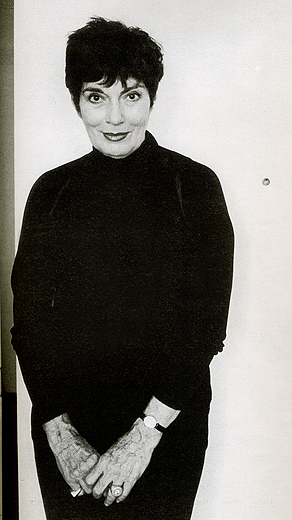
Jackie Rogers by Chris Buck, 1997 |
|

©
index magazine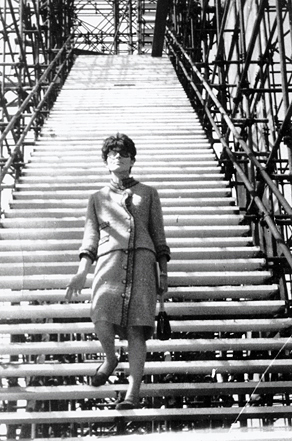
Jackie Rogers in 8 1/2, courtesy of Jackie Rogers |
 |
©
index magazine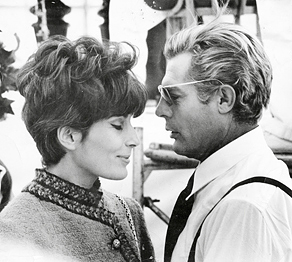
Jackie Rogers with Marcelllo Mastroianni, courtesy of Jackie Rogers |
|
 |
|
|
|
 |
 |
|
Copyright © 2008 index Magazine and index Worldwide. All rights reserved.
Site Design: Teddy Blanks. All photos by index photographers: Leeta Harding,
Richard Kern, David Ortega, Ryan McGinley, Terry Richardson, and Juergen Teller |
| |